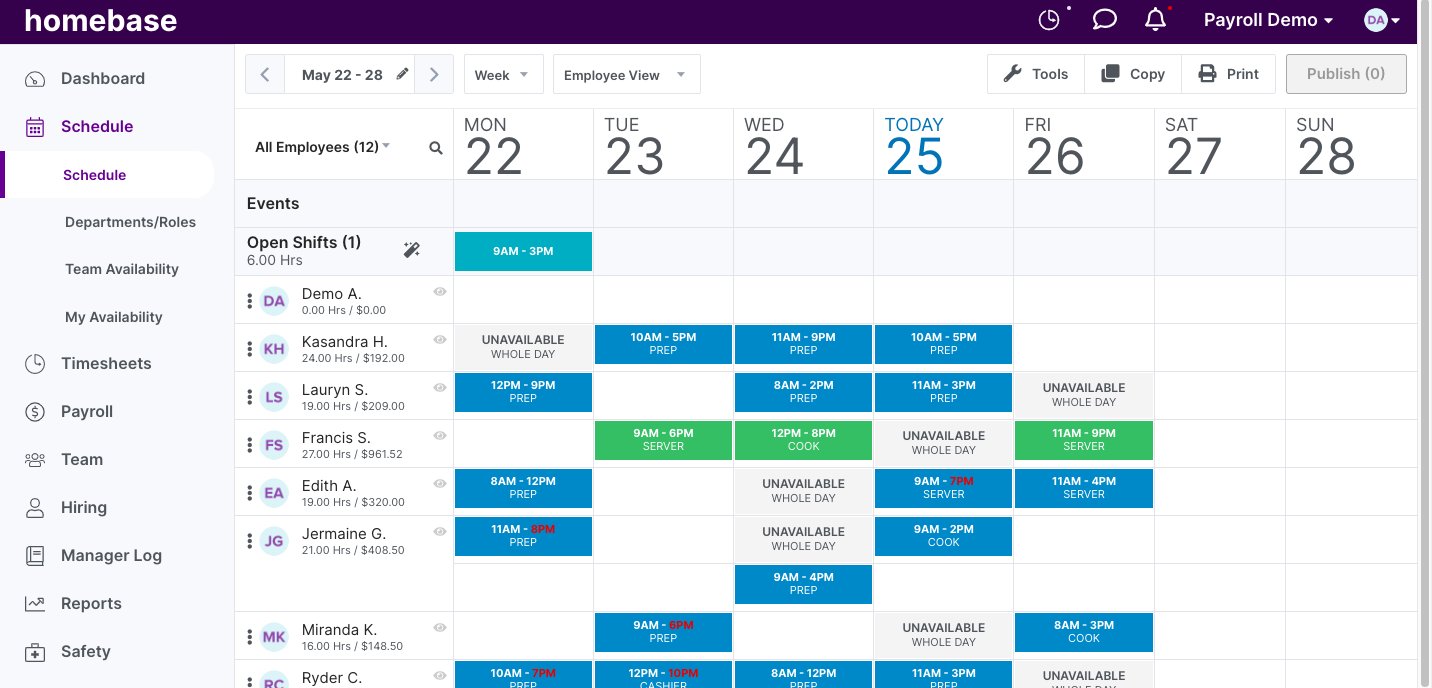Top 8 Time Tracking Software in 2023

Table of Contents
Have you ever wondered how many billable hours slip through unnoticed, affecting your company’s bottom line? Or how much time each employee spends on particular projects — and how this impacts overall productivity?
That’s where time tracking software comes in. It can help you:
- Accurately track hours for invoicing clients
- Automatically calculate hours worked for easier payroll management
- Meet compliance requirements with labor laws
- Maintain a balanced workload across teams and projects
But how do you identify the right time tracking tool for the job?
In this article, we’ll explore the key features, pros and cons, pricing, and user ratings for the best time tracking tools so you’ll know what to look for before you invest.
All user feedback referenced in the article has been sourced from independent software review platforms, like G2 and Capterra, in June 2023.
What to look for in time tracking software
When looking for the best time tracking software, you should consider factors like:
- Versatility: If you’re new to using automated time tracking solutions, it’s best to start with an all-in-one platform that has key features for messaging, hiring, and HR and compliance. This will help you simplify processes, improve efficiency, and reduce the risk of errors that can occur when transferring data between different systems.
- Ease of use: Everyone on your team should be able to get the hang of new tools quickly. It should play nice with the other software your team uses, like your project management apps or calendars.
- Integrations: Software that integrates with other popular apps helps you save time manually inputting data from one system to another. It should connect with tools you use daily, like email systems, project management tools, or your billing and payroll software.
- Real-time tracking: Look for a tool that lets you see what’s being worked on in real time. This way, you can spot potential problems early, keep projects on track, and make sure your team is focusing on the right tasks.
- Scalability: As your business expands, your tool should be able to handle more users, more projects, and more data without a hiccup, saving you the trouble of switching systems down the road.
The 8 best time tracking software solutions
Your business needs are unique so we’ve carefully curated a list of the top 8 solutions based on the best use case for each platform:
- Homebase: Best for comprehensive time tracking and beyond
- Connecteam: Best for large retail companies
- Deputy: Best for unique compliance features
- Wrike: Best for project management
- Toggl: Best for time tracking and management
- ClickUp: Best for agile management
- Monday.com: Best for customized workflows
- BigTime: Best for task tracking
1. Homebase: Best for comprehensive time tracking and beyond

At its core, Homebase is an employee scheduling and time tracking tool that lets employees clock in and out of their shifts across devices — smartphones, tablets, or desktops. This data is automatically converted into timesheets, simplifying the task of tracking hours worked, breaks taken, and overtime due.
Homebase also helps with hiring and onboarding. You can post job listings directly from the platform, which speeds up the hiring process. And once a new hire is onboarded, you can send them welcome kits through Homebase, ensuring a consistent onboarding experience for all staff.
Homebase is ideal for businesses that need to manage employees across multiple roles or wage rates across sectors like retail, healthcare, and hospitality.
Top features
- Easy employee scheduling that auto-populates timetables and ensures proper coverage for customers at all times while accommodating employees’ needs such as requested vacations
- Self-scheduling tools for employees to claim open shifts, arrange trades and covers, and request time off
- Time tracking with GPS and geofencing features for precise tracking of hours worked, including breaks and overtime. This way, you can manage remote teams better.
- Team communication app that sends auto alerts for late arrivals, no-shows, and missed breaks
- Payroll management function that calculates taxes and paychecks, sends direct deposits to your team, and automatically pays and files your payroll taxes
- Labor law compliance tools with built-in break rules, overtime warnings, and records storage of all actions making you audit-ready
- A mobile app that helps manage everyday tasks from anywhere
- Report generation for labor costs, employee performance, and sales forecasts
Pros and cons
| Pros | Cons |
|---|---|
| Free account that includes basic scheduling and time tracking tools for up to 20 employees | No performance management tools |
| Quick and easy set up | |
| Easy shift-swapping for managers and employees | |
| Affordable with its per-location pricing | |
| Easy to use with no learning curve | |
| Integrated payroll system syncs data avoiding manual entries | |
| Designed for small to medium-sized businesses employing hourly staff |
Pricing
Homebase offers a variety of services at different price points, and customers save 20% on all pricing when they opt for annual billing.
- Basic or Free plan for one location and up to 20 employees with basic scheduling and time tracking, employee management tools like Messaging, point-of-sale integrations, and access to email support.
- Essentials plan starting at $24.95 per month per location includes everything in Basic plus payroll integrations, team communication, performance tracking, advanced time tracking and scheduling, and access to live support.
- Plus plan starting at $59.95 per month per location includes everything in Essentials, plus hiring tools, retention and performance tracking, time off controls, and departments and permissions.
- All-in-one plan starting at $99.95 per month per location includes everything in Plus, with HR and compliance, new hire onboarding, labor cost controls, and business insights
User ratings
2. Connecteam: Best for large retail companies
Connecteam helps managers and employees stay in touch, keep track of working hours, organize work schedules, fill out forms, and manage tasks. It’s ideal for businesses where employees don’t all work in the same place or at the same time, like remote teams or shift workers.
Top features
- Employee scheduling helps program shifts and set up recurring shifts and overtime
- Task management helps delegate recurring tasks to employees with real-time updates on task completion
- Employees complete reports, forms, checklists, and requests directly
- Time clock with GPS lets employees clock in and out from anywhere
Pros and cons
| Pros | Cons |
|---|---|
| User-friendly platform with customization options | Using a new feature requires upgrading to pricing plan |
| Single dashboard to manage your team where all your employee information is displayed | Doesn’t support assigning different roles and pay rates to the same employee |
| Automated end-of-shift reports give an overview of employees’ work |
Pricing
Connecteam’s pricing varies based on the features you need ranging between $35 to $119.
User ratings
3. Deputy: Best for unique compliance features
Deputy is a staff scheduling and time tracking app that helps managers and supervisors to create and modify schedules for their teams, set and track tasks, and monitor time and attendance. Employees can use the tool to clock in and out, view their schedules, request time off, and communicate with their peers and managers.
Its Active Attestation feature prompts managers when employees have requested to work overtime, leave early, or miss a break, ensuring your business is compliant with labor laws.
Top features
- Time and attendance management for tracking employee hours and attendance, ensuring accurate payroll and compliance with labor laws
- Absence management for tracking sick leave or vacation time
- Centralized place to store and access all employee information
- Staff document management for storage and management of contracts and performance reviews
- Reporting and analytics provide insights into business operations
Pros and cons
| Pros | Cons |
|---|---|
| User friendly with no learning curve | Employees cannot book last-minute unavailability if the schedule has been written but not yet published |
| Employees can clock in and clock out on Apple Watch | Doesn’t support iOS with all functionalities |
| Real-time visibility of employee attendance pattern | Limited customizations for creating workflows |
Pricing
Deputy offers a 31-day free trial for all the plans based on the functionalities you need. Scheduling and Time & Attendance plans are priced at $3.50 per user per month and the Premium plan that includes reporting features starts at $4.90 per user per month. But if you have a team of 250+ employees or need customized workflows, then you can request a quote.
User ratings
4. Wrike: Best for project management
Wrike is a project management and collaboration tool that helps teams of any size better organize their work in a centralized place and track their progress. Wrike is known for its flexibility, as it can be customized to fit specific workflows and business needs.
Top features
- Task management helps create, assign, schedule, and monitor tasks within a project
- Collaborative editing features let your team brainstorm in real-time
- Gantt charts provide a visual timeline for projects
- Customizable reports provide insights into project progress and productivity
Pros and cons
| Pros | Cons |
|---|---|
| Auto scheduling and time tracking reduce reliance on email and spreadsheets | Limited customization features in reports |
| Integration with calendars, document management tools, and cloud storage services brings all data in one place | The in-app timer is only available in the higher priced plans |
| Easy set up for recurring and deadline-oriented tasks | New users can find the interface challenging |
Pricing
Wrike offers a free plan for basic centralized task management features. But if you have a team of 2-25 users, you can opt for the Team plan at $9.80 per user per month or the Business plan at $24.80 for up to 200 users. You can request a quote for any customized solutions for your business.
User ratings
5. Toggl: Best for time tracking and management
Toggl is an intuitive time tracking software that provides accurate time reports with easy-to-use filtering, sorting, and exporting options for data by user, task, or project.
Top features
- Project management solution with drag-and-drop scheduling, project estimates and historical billable rates
- Team management features like user groups, team member audits, and automated email team reminders
- Reporting dashboards provide insights into project, team, and date-specific time entries
- Integrates with popular apps like Asana, Evernote, and Google Calendar
Pros and cons
| Pros | Cons |
|---|---|
| Free version is best suited for freelancers and individuals | The Pomodoro Timer function varies from browser extension to mobile app to desktop software |
| Desktop timer synchronizes with its mobile app, allowing for on-the-go corrections | Doesn’t integrate with invoicing tools |
| Simplified reports of how people have spent their time and on different projects |
Pricing
Toggl is free for up to 5 users. But if you want advanced features like pre-populated project templates, time tracking audits, and project forecast analytics, you can opt for the Starter plan at $10 per user per month or the Premium plan at $20 per user per month. You can also request a custom quote.
User ratings
6. ClickUp: Best for agile management
ClickUp is a project management tool designed to help teams organize and manage their work. Its sprint workflows and dashboard make it ideal for teams that follow agile project management methodologies. ClickUp allows for a high level of customization in its views and workflows, without needing code or add-ons. This means it can adapt to a wide range of team needs and workflows.
Top features
- Product management features allow teams to collaborate on sprints, roadmaps and backlogs
- The ability to automate sprint workflows and streamline bug and issue tracking
- 15+ customizable views like list, board, box, calendar, Gantt, workload, table, map, and whiteboard views
- Customization without code or add-ons lets teams tailor relations between tasks, documents, and more
- Dashboard allows for the addition of visual widgets for tasks, time tracking, and sprints
Pros and cons
| Pros | Cons |
|---|---|
| Customizable automations and templates can be used for various use cases | Automations frequently fail during critical periods |
| Workflow charts and todo lists easily integrate into existing sales funnels | The mobile app has limited functionality as compared to the desktop version |
| The tool is intuitive and easy to get started with | Lags in the software mean new tasks or folders may not be reflected immediately |
Pricing
Click Up’s free version is ideal for personal use while the Unlimited plan is ideal for small businesses at $5 per user per month. But if you have a mid-sized team, you can opt for the Business plan at $12 per user per month or the Business Plus plan at $19 per user per month.
User ratings
7. Monday.com: Best for customized workflows
Monday.com is a flexible code-free platform that allows teams to run projects, and workflows, and track daily work. The intuitive building blocks (like columns, views, automation, and integrations) help create a board-based structure that offers a clear view of progress and tasks.
Top features
- Personalized dashboards give an overview of projects to track progress, timelines, and budgets
- Code-free automation for tasks like status updates, email notifications, due date alerts, task assignments, and progress updates
- File management offers a centralized collaborative space with status updates, smart notifications, and version control
- Integrations with popular business tools like MS Teams, Dropbox, and Slack
Pros and cons
| Pros | Cons |
|---|---|
| Intuitive and easy to use | Limited features mean investing in additional apps alongside Monday.com |
| High-priority task alerts help prioritize deadlines and workload | Limited flexibility in the mobile app as compared to desktop |
| Easy navigation with virtual interface | Learning curve for employees who aren’t tech-savvy |
| Flexibility in creating and customizing workflow with custom boards, columns, and automation rules |
Pricing
While Monday.com offers a free plan, it’s limited to 2 seats. If you want advanced features like Gantt views, integrations, and custom dashboards then you can opt for the paid plans ranging between $8 to $16 per seat per month or request a custom quote.
User ratings
8. BigTime: Best for task tracking
BigTime is an integrated time tracking, billing, and task management software. In other words, the platform links timesheets, budgets, tasks, and expenses to monitor the real-time status of a project. BigTime was developed by a professional service company to meet its own requirements and challenges like managing employees, work, time, expenses, clients, and project billing.
Top features
- Timesheets with customized daily or weekly views, automated notifications for review and workflow approvals
- Budget and task management tool helps set up tasks per project with hourly rates, fees, and expense budgets
- Flexible billing rates and customizable invoice templates
- Permissions-based viewing and exporting tools
- Native mobile apps for iOS and Android with offline functionality and auto-sync when a connection is available
- Integrations with popular tools like Salesforce, QuickBooks, Slack, and Google Apps SSO
Pros and cons
| Pros | Cons |
|---|---|
| Real-time tracking and analysis of current projects | Complex functionalities have a learning curve |
| Project and budget forecasting | No billing-related project-specific dashboards |
| Easy integration with Quickbooks Online |
Pricing
BigTime offers four pricing plans:
- Essentials — $20 per user per month with basic features like time management, approvals, and expense management
- Advanced — $35 per user per month including project templates and multi-currency management
- Premier — $45 per user per month including multi level approvals and project budgeting
- Projector — Starts at $60 per user per month including multi-entity and complex project accounting
User ratings
So, which time tracking software should you choose?
Choosing the right time tracking software for your business is all about finding the right balance between your unique needs and the tool’s functionality. For example, if you’re a large retail business then Connecteam is a good choice.
And if you want to customize workflows for each project then you can opt for Monday.com. But if you want a platform that can do it all, Homebase is your go-to.
With Homebase, you don’t have to juggle between different tools. You can run time tracking, scheduling, payroll, hiring, and communication in a single, user-friendly interface. Plus, it’s free for up to 20 employees and takes only a few minutes to set up an account.
Whether you’re a small business owner juggling multiple roles or a manager in a growing company, Homebase empowers you to focus more on growth and innovation, and less on administrative tasks.




